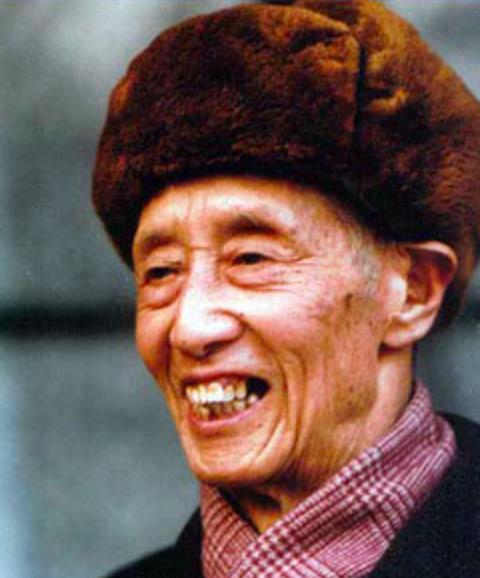Among the 5th phase of Huangpu were many famous generals, including General Xu Guangda, General Zhang Zongxun, General Yang Zhicheng, General Song Shilun, Major General Liao Yunzhou, Major General Zhou Wenzai, Major General Zhang Kaijing, General Guo Rugui, and so on the Kuomintang army, including Lieutenant General Zheng Tingdi and Major General Qiu Xingxiang.
He was also born in the 5th term of Whampoa. However, he later abandoned wu congwen and became a famous poet, whose poems are well-known and still hit people's hearts to this day!

He once wrote a poem like this:
"Some people are alive/He's dead;/Some people are dead/He's alive."
Now he knows who he is, right? He was the famous poet, the Collector.
Everyone knows that Zangkejia is a great poet, and his poems are available in the chinese textbooks of the sixth grade of primary school, but there are probably not many people who know that he was once a student of the Whampoa Military Academy, a well-known military school. So why did the Tibetans abandon Wen Congwu and apply for the Whampoa Military Academy, and why did they abandon Wu Congwen again? Next, I will tell you about this story of the Zangke family.
The Zangke family is a native of Zhucheng, Shandong Province, born in 1905. Although he was born into a shabby landlord family, his parents still attached great importance to the cultivation and education of their children, so the Zangke family was sent to school from an early age, and in the summer of 1923, he was also admitted to the Shandong Provincial First Normal School. During his time at the school, the collectors read a large number of domestic and foreign literary works and began to learn new literary creations.
The young Collectors, like most spirited literary youths, were filled with infinite yearning in the face of the surging revolutionary upsurge. Especially after the start of the Northern Expedition, the Tibetans who were studying in Jinan realized that Jinan was also being greatly affected by the revolutionary wave, and they could not bear the perverse and heavy oppression of Zhang Zongchang, the chairman of Shandong Province, so they resolutely interrupted the study of the First Normal School, and went to Wuhan, the seat of the revolutionary government, with two other relatives and friends, to apply for the Huangpu Wuhan Branch.
The recruitment examination of the Whampoa Military Academy was still very strict, so the first examination was not passed by the Zangke family, but he insisted on retaking the exam, and in early 1927, he was finally admitted to the 5th period of Whampoa. The Tibetan who became a soldier was full of hope for the future of the revolution, and from the moment he put on his uniform, he even aspired to become a general, so he participated in hard military training and studied military theory.
But the disillusionment of dreams is always in an instant. After the "April 12 counter-revolutionary coup", he was in Ye Ting's 24th Division to face the rebellious Xia Douyin's troops, and when they returned to Wuhan in triumph, they were greeted not by flowers, but by the Nationalist government's "Qing Party" expulsion order. Of course, Zang Kejia did not know what was happening, but he felt that his revolutionary enthusiasm was being torn apart little by little by the ruthless struggle, was the revolution meant to kill his brothers and comrades who accompanied him day and night? He could not accept it, let alone dedicate himself to the Kuomintang army.
In August 1927, Zang Kejia and his classmates left the army and returned to their hometown in Shandong, picking up a pen again, recounting the miserable life of the old Chinese peasants who endured humiliation and burden, exposed the evil and hypocrisy of imperialism, and used pens to lash out at the ugliness of the old world. Soon, however, he was persecuted by the Kuomintang reactionaries and had to go into exile in the northeast, until 1930, when he returned and was admitted to Qingdao University.
After that, the Collector began his literary career, and during his lifetime, he published more than 60 works and became a famous poet.
At that time, the Tibetans might have become a general if they remained in the army, but China lacked a famous poet.
His poem, "Some People", mentioned at the beginning of this article, was written in November 1949 to commemorate the 13th anniversary of Lu Xun's death, and the full text of the poem reads like this:
Some people are alive/he is dead; / Some people are dead/He is still alive. / Some people / Ride on the heads of the people: "Ah, how great I am!" "/ Some people / Lean down to be cattle and horses for the people. / Some people / carved their names into stone and wanted to be "immortal"; / Some people / willing to be weeds, waiting for the fire underground. / Some people / He lives others can't live; / Some people / He lives for the betterment of the majority.
The one who rides on the head of the people / The people who break him down; / The one who makes cattle and horses for the people / The people will always remember him! / The one who carved his name into stone / The name rots earlier than the corpse; / As long as the spring wind blows to the place / There are green weeds everywhere. / He lives a man who no one else can live, / His end can be seen; / He lives for the better living of the majority, / The crowd lifts him up very high, very high.
This "Some People" of the Zangke family is still directly hitting people's hearts when read today, and this is a good poem that can be passed down through the ages.